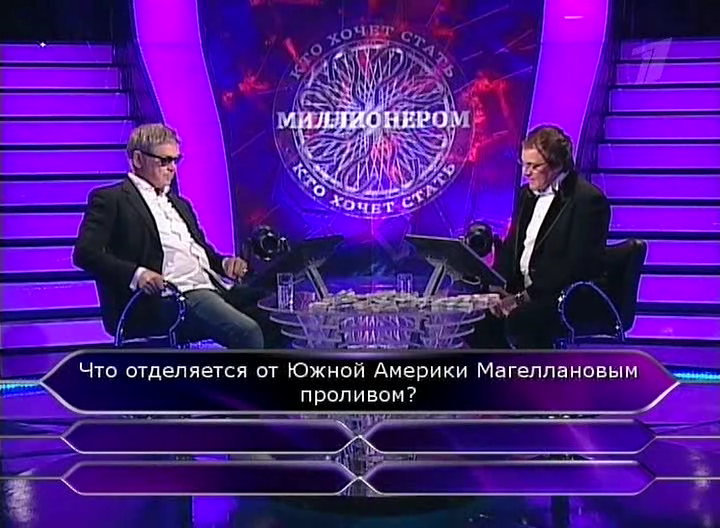
Kto Hochet Statj Millionerom Delphi
Contents • • • • • • • • • • Broadcast history [ ] The Russian version of the series premiered on October 1, 1999 on NTV. Initially, the program was called, 'O, schastlivchik!' ('Oh, Lucky Man!' ), presented by Dmitry Dibrov.
The game combines the simplicity of the rules to provide an opportunity to win the top prize of 1 million rubles. The series gained enormous popularity among Russian audiences, and in 2000, was awarded a Taffy award for Best Entertainment Program. On February 19, 2001, the program moved to channel ORT (Channel One) and was renamed to its current title to reflect the name of the franchise. Dibrov departed the show, and was succeeded by comedian. On September 17, 2005 the money tree was revised, with the top prize now worth 3 million rubles.
On December 21, 2008 Dibrov returned to hosting the show once more. Easy peasy homeschool. Payout structure [ ] Question number Question value (in Russian Rubles) (Yellow zones are the guaranteed levels) Former: Classic format (2001-2005) Current: Classic format (2005-present) Risk format (2010-present) 1 100 500 500 2 200 1,000 1,000 3 300 2,000 2,000 4 500 3,000 3,000 5 1,000 5,000 5,000 6 2,000 10,000 10,000 7 4,000 15,000 15,000 8 8,000 25,000 25,000 9 16,000 50,000 50,000 10 32,000 100,000 100,000 11 64,000 200,000 200,000 12 125,000 400,000 400,000 13 250,000 800,000 800,000 14 500,000 1,500,000 1,500,000 15 1,000,000 3,000,000 3,000,000 Old game's version [ ].
This article's does not adequately key points of its contents. Please consider expanding the lead to of all important aspects of the article. Please discuss this issue on the article's. ( February 2018) Object Pascal,,,,,, Initially Apple Computer with input from, and then by Borland International, led by First appeared 1986; 33 years ago ( 1986) (dynamic typing through Variants, array of const and ),,.p,.pp,.pas Major (, ), (,,,, and ), (,, Native ), Smart Mobile Studio () Apple,, (using objfpc or delphi mode), Delphi, Delphi.NET, Delphi Web Script, Influenced by,, Influenced,,,, Object Pascal refers to a branch of derivatives of, mostly known as the primary of. This section needs expansion with: additional citations.
You can help. ( April 2009) Object Pascal is an extension of the Pascal language that was developed at by a team led by in consultation with, the inventor of Pascal. It is descended from an earlier object-oriented version of Pascal called, which was available on the computer.
Object Pascal was needed in order to support, an expandable Macintosh application framework that would now be called a. Object Pascal extensions, and MacApp itself, were developed by Barry Haynes, Ken Doyle, and Larry Rosenstein, and were tested by Dan Allen. Oversaw the project, which began very early in 1985 and became a product in 1986. An Object Pascal extension was also implemented in the Think Pascal IDE. The IDE includes the compiler and an editor with and checking, a powerful debugger and a class library. Many developers preferred Think Pascal over Apple's implementation of Object Pascal because Think Pascal offered a much faster compile/link/debug cycle, and tight integration of its tools.
The last official release was Think Pascal 4.01, in 1992, though later released an unofficial version 4.5d4 at no charge. Apple dropped support for Object Pascal when they moved from Motorola 68K chips to IBM's architecture in 1994.
This is the eighteenth season of Kto khochet stat' millionerom?, Russian version of Who Wants to Be a Millionaire? (Except O, Schastlivchik!' It's hosted by Dmitry Dibrov. Delphi is located in upper central Greece, on multiple plateaux along the slope of Mount Parnassus, and includes the Sanctuary of Apollo, the site of the ancient Oracle.This semicircular spur is known as Phaedriades, and overlooks the Pleistos Valley. In myths dating to the classical period of Ancient Greece (510-323 BC), Zeus determined the site of Delphi when he sought to find the centre of.

MacApp 3.0, for this platform, was re-written in. Borland, Inprise, CodeGear and Embarcadero years [ ] In 1986, introduced similar extensions, also called Object Pascal, to the product for the Macintosh, and in 1989 for Turbo Pascal 5.5 for DOS. When Borland refocused from to in 1994, they created a successor to Turbo Pascal, called and introduced a new set of extensions to create what is now known as the Delphi language. The development of Delphi started in 1993 and Delphi 1.0 was officially released in the United States on 14 February 1995. While code using the Turbo Pascal object model could still be compiled, Delphi featured a new syntax using the keyword class in preference to object, the Create constructor and a virtual Destroy destructor (and negating having to call the New and Dispose procedures), properties, method pointers, and some other things. These were inspired by the working for object-oriented extensions, but many of the differences from Turbo Pascal's dialect (such as the draft's requirement that all methods be ) were ignored. The Delphi language has continued to evolve over the years to support constructs such as,.